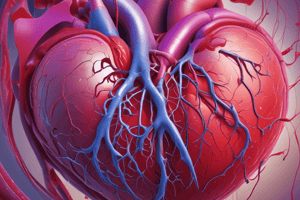Podcast
Questions and Answers
What condition is specifically characterized by right-heart failure due to a pulmonary cause?
What condition is specifically characterized by right-heart failure due to a pulmonary cause?
- Cor pulmonale (correct)
- Congestive heart failure
- Cardiomyopathy
- Left ventricular hypertrophy
In cor pulmonale, what is the expected status of the pulmonary capillary wedge pressure (PCWP)?
In cor pulmonale, what is the expected status of the pulmonary capillary wedge pressure (PCWP)?
- Inconclusive without further testing
- Elevated due to heart failure
- Normal despite right-heart failure (correct)
- Lower than normal range
Which of the following findings is NOT a typical symptom of congestive heart failure?
Which of the following findings is NOT a typical symptom of congestive heart failure?
- Wheezing (correct)
- Peripheral edema
- Dyspnea
- JVD (Jugular venous distention)
A patient with emphysema is likely to present with which of the following cardiac silhouettes?
A patient with emphysema is likely to present with which of the following cardiac silhouettes?
What is the primary reason for right heart decompensation in both cor pulmonale and congestive heart failure?
What is the primary reason for right heart decompensation in both cor pulmonale and congestive heart failure?
What would be an indicator that right-heart failure is not due to left-heart failure?
What would be an indicator that right-heart failure is not due to left-heart failure?
What is the primary cause of dyspnea in left heart failure?
What is the primary cause of dyspnea in left heart failure?
Which physical exam finding is most indicative of right heart failure?
Which physical exam finding is most indicative of right heart failure?
What does a high pulmonary capillary wedge pressure (PCWP) indicate?
What does a high pulmonary capillary wedge pressure (PCWP) indicate?
Which of the following is a common symptom associated specifically with left heart failure?
Which of the following is a common symptom associated specifically with left heart failure?
What does a normal jugular venous pressure (JVP) indicate?
What does a normal jugular venous pressure (JVP) indicate?
What is the most common cause of right heart failure?
What is the most common cause of right heart failure?
Which of the following findings is not typically associated with right heart failure?
Which of the following findings is not typically associated with right heart failure?
What defines congestive heart failure?
What defines congestive heart failure?
Flashcards are hidden until you start studying
Study Notes
Left Heart Failure
- Presents with pulmonary symptoms: dyspnea, orthopnea, paroxysmal nocturnal dyspnea.
- Backed pressure from the left heart leads to increased pulmonary capillary hydrostatic pressure, resulting in pulmonary edema.
- Possible development of pleural effusion.
- Left atrial pressure (LAP) correlates with pulmonary capillary wedge pressure (PCWP).
- Elevated PCWP indicates left heart pathology.
- Normal PCWP signifies no issues with the left heart.
- High PCWP alongside low blood pressure suggests cardiogenic shock.
- Important for USMLE questions: left-heart pathology and dyspnea point to increased pulmonary capillary hydrostatic pressure or increased alveolar-arteriolar oxygen gradient as causes of dyspnea.
Right Heart Failure
- Manifests through systemic symptoms: jugular venous distension (JVD) and peripheral edema.
- Inability of blood to flow effectively into the right heart results in elevated neck veins and fluid accumulation in the legs due to increased venous hydrostatic pressure.
- Central venous pressure may be high.
- Normal jugular venous pressure (JVP) is 3 cm above the sternal angle; levels above this indicate JVD.
- Misinterpretation possible: jugular venous pulsations at 3 cm do not equate to JVD.
Congestive Heart Failure
- Defined as the combination of left heart failure and right heart failure.
- Most common cause of right heart failure is left heart failure.
- Patients exhibit symptoms of both heart failures: dyspnea, JVD, and peripheral edema.
- Elevation of PCWP occurs due to left heart pathology.
Cor Pulmonale
- Characterized as right heart failure due to pulmonary conditions, with normal left heart function and normal PCWP.
- Common in patients with significant lung diseases (e.g., smoking history, cystic fibrosis, pulmonary fibrosis).
- Symptoms include JVD and peripheral edema related to obvious lung pathology.
- Important to differentiate that cor pulmonale is not primarily due to left heart failure in these cases.
- Patients may display right ventricular hypertrophy without left ventricular hypertrophy, described as a "boot-shaped" heart.
- In cases of COPD, hyperinflated lungs can shift cardiac silhouette to midline, leading to a narrow appearance with a point of maximal impulse in the sub-xiphoid space.
- Increased afterload due to pulmonary hypertension is the trigger for right heart decompensation in both cor pulmonale and congestive heart failure.
Studying That Suits You
Use AI to generate personalized quizzes and flashcards to suit your learning preferences.




